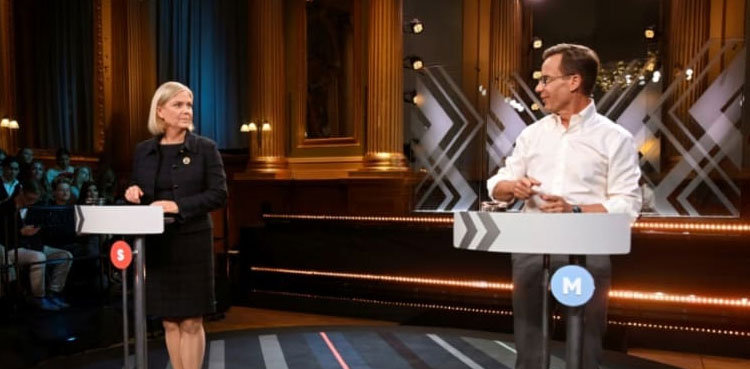
Swedes voted in a general election Sunday that will either pave the way for an unprecedented right-wing government supported by the far right or a third straight mandate for the ruling Social Democrats.
Opinion polls have predicted a close race with a razor-thin lead for Prime Minister Magdalena Andersson’s Social Democrats and the left bloc, following a campaign dominated by rising gang shootings and soaring electricity prices.
Polling stations were to close at 8:00 pm (1800 GMT), with final results due by midnight.
At a voting station in Stockholm’s Central Station, 34-year-old IT worker Erwin Marklund said he was concerned about the rise of the far right and had voted for the small Left Party.
“It’s important to not get the far right into the system”, he told AFP.
The right-wing bloc has never before agreed to cooperate with the nationalist and anti-immigration Sweden Democrats, long treated as “pariahs” by other political parties.
The far right has leapt to second place in opinion polls behind the Social Democrats in the final weeks of the campaign, credited with around a fifth of intended votes.
Their surge — overtaking the traditional leaders of the right-wing bloc, the conservative Moderates — was attributed to an election race focused on issues including crime, segregation and the integration of immigrants.
Prime Minister Andersson, 55, hopes however to hang onto power with the support of the small Left, Centre and Green parties.
“It’s going to be very, very close”, she told reporters as she cast her ballot in the Stockholm suburb of Nacka on Sunday.
More than 80 percent of Sweden’s 7.8 million eligible voters were expected to cast ballots, and more than 2.8 million voted in advance, election officials said.
– Tough days ahead –
Andersson, whose party has dominated Swedish politics since the 1930s, enjoys broad support among Swedes.
She has consistently led her challenger for the post of prime minister, Moderates leader Ulf Kristersson, by a wide margin in opinion polls.
Yet pollsters put the two blocs in an almost dead heat, predicting 49.7 to 51.6 percent of voter support for the left and 47.6 to 49.4 percent for the right.
While online betting sites meanwhile gave Andersson as the favourite, Kristersson said Sunday he felt confident.
“It feels like we have a lot of support and wind in our sails”, he said as he cast his ballot.
Kristersson is the architect behind a major U-turn for the right wing.
He launched exploratory talks with the Sweden Democrats in 2019 and deepened their cooperation before the two other small right-wing parties, the Christian Democrats and to a lesser extent the Liberals, followed suit.
Sweden Democrats’ leader Jimmie Akesson told reporters as he queued in a long line to vote in Stockholm that “we hope to be in the government”, and his first priority would be to “push back crime”.
“As it stands, we have two fairly clear blocs,” political scientist Katarina Barrling told AFP, noting it should be fairly easy to predict the next prime minister after election night.
However, both blocs are beset by internal divisions that could make for lengthy negotiations to build a coalition government.
Barrling noted there was “pressure to have a united and effective government” in place quickly, as Sweden faces a looming economic crisis, is in the midst of a historic NATO application process and is due to take over the EU presidency in 2023.
– ‘Enormous shift’ –
The end of the Sweden Democrats’ political isolation, and the prospect of it becoming the biggest right-wing party, is “an enormous shift in Swedish society”, said Anders Lindberg, an editorialist at left-wing tabloid Aftonbladet.
Born out of a neo-Nazi movement at the end of the 1980s, the Sweden Democrats entered parliament in 2010 with 5.7 percent of votes. They won 17.5 percent in 2018.
The party’s surge comes as Sweden struggles to combat escalating gang shootings attributed to battles over the sales of drugs and weapons.
The country now tops European statistics for firearm deaths.
While the violence was once contained to locations frequented by criminals, it has spread to public spaces such as parks and shopping centres, sparking concern among ordinary Swedes in a country long known as safe and peaceful.
from International News Today - Breaking News, US News, World News https://ift.tt/eJI8KiD https://ift.tt/7fvjsEw

No comments:
Post a Comment